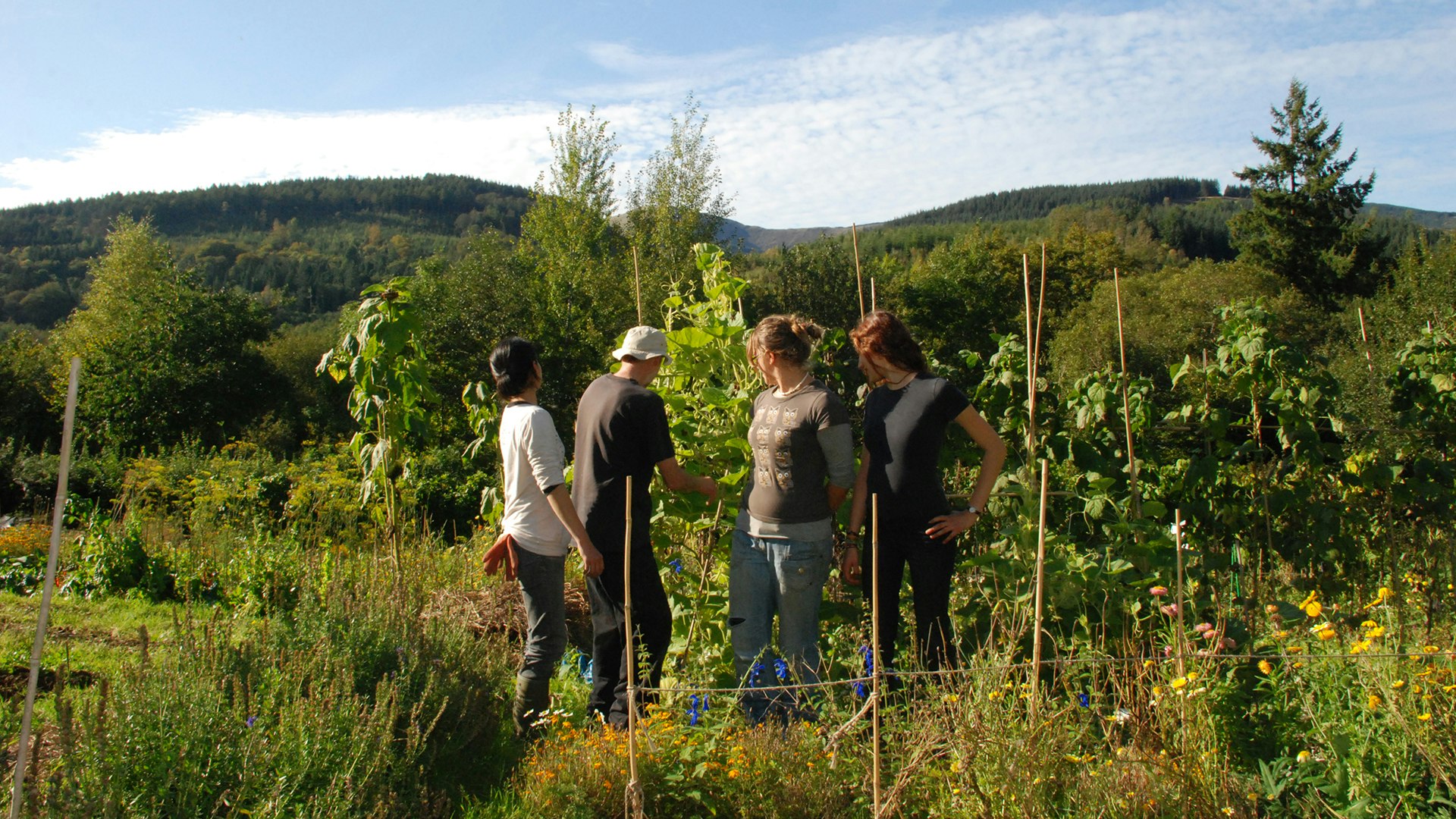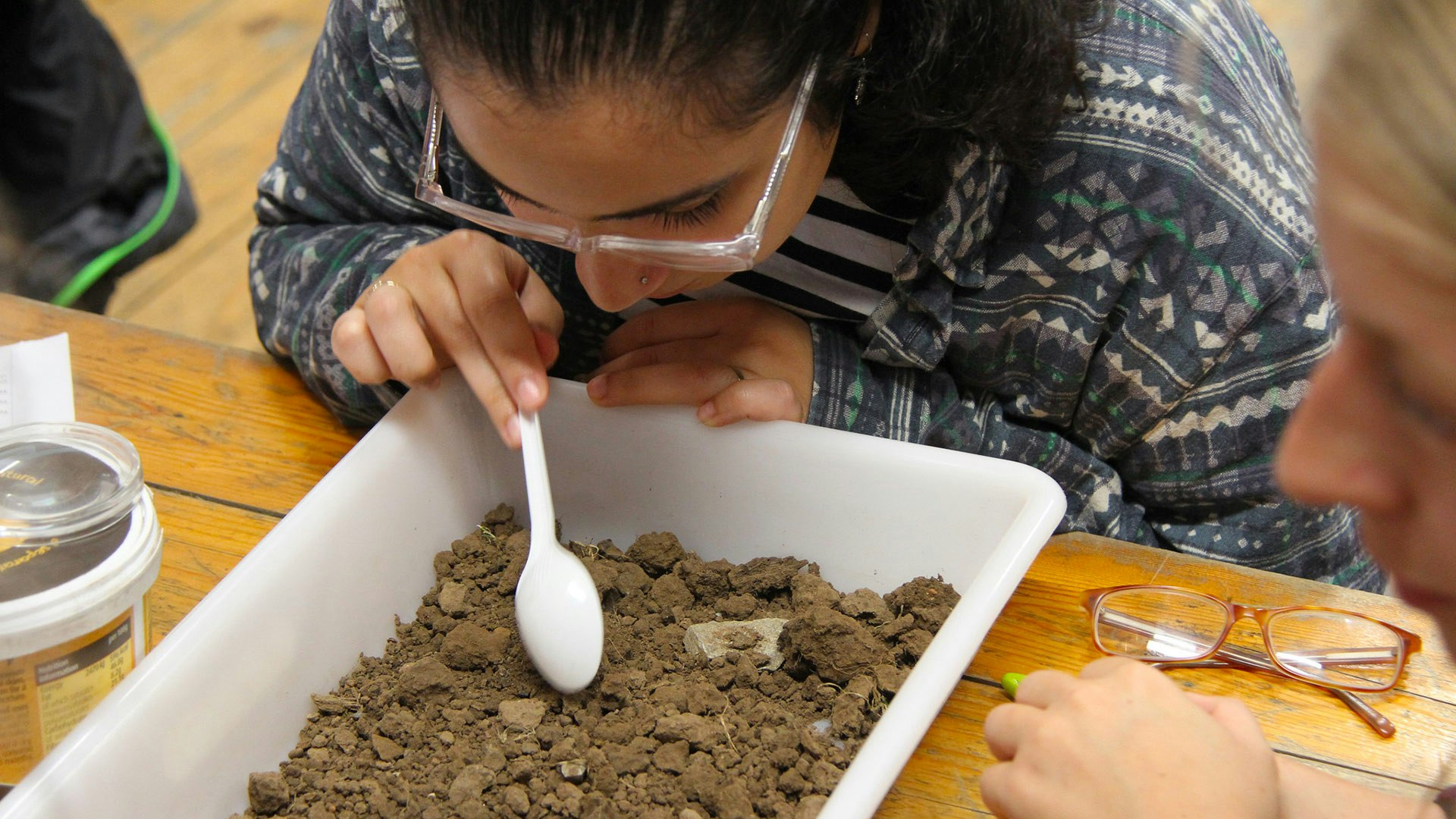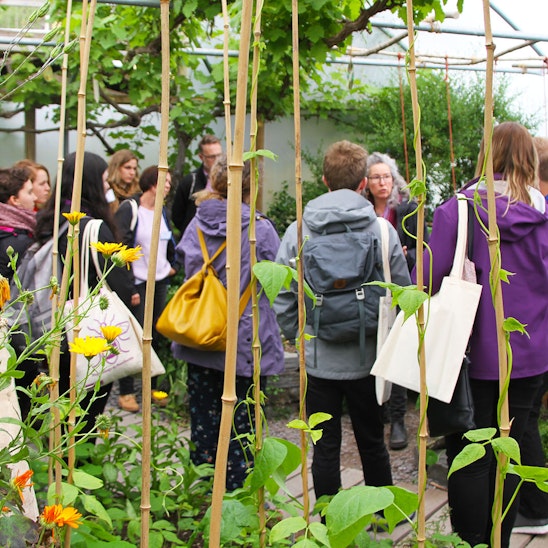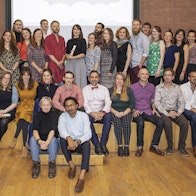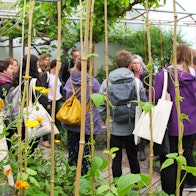Core modules
Introduction to Sustainability and Adaptation
This introductory 15-credit core module starts in September and must be taken at the beginning of your course, no matter which route you take through your studies.
In this module, we will establish the overarching concepts and theoretical grounding in sustainability, resilience and transformational adaptation, contextualise the view of current environmental changes, and explore the interconnectedness of the factors involved with these changes.
There will be an in-depth look at the wider implications of transformational adaptation on social structures and sustainability issues, including land use, trade, resource management, energy provision, governance, health and economic systems through a critical exploration of the primary considerations related to sustainability and environmental change.
The module is followed either by our ‘Sustainability and Adaptation Concepts in Practice’ module or ‘Introduction to Sustainability in Energy Provision and Demand Management’ module starting in November, depending on your programme.
This is a 15 credit module.
Read more about this module for courses awarded by the University of East London:
EV7132 – Introduction to Sustainability and Adaptation (After September 2022)
Read more about this module for courses awarded by Liverpool John Moores University:
7522CATSCI – Introduction to Sustainability and Adaptation - LJMU
What’s it like to study at CAT? Read more about the teaching and learning experience.
This introductory 15-credit core module starts in November and must be taken following the ‘Introduction to Sustainability and Adaptation’ module which starts in September, at the very beginning of your course, no matter which route you take through your studies.
In this module, you will gain an understanding of transformational adaptation planning in practice through a facilitated self-reflective practical team exercise, and form a deep appreciation and holistic understanding of adaptation transformation planning strategies and processes.
You will develop the skills and knowledge needed to contextualise the discipline of transformational adaptation in relation to current environmental change and learn how to make informed decisions, despite the uncertainties that come with a changing climate.
This is a 15 credit module.
Read more about this module for courses awarded by the University of East London:
EV7137 – Sustainability and Adaptation Concepts in Practice (After September 2022)
Read more about this module for courses awarded by Liverpool John Moores University:
7523CATSCI – Sustainability and Adaptation Concepts in Practice - LJMU
What’s it like to study at CAT? Read more about the teaching and learning experience.
This module takes an in-depth look at global and local trends in food production, diet and health, and the impact of food production on the environment, including climate change.
We explore how food can be produced sustainably, looking at the role of consumer behaviour, economics, technology and legislation.
You will study the complex interplay between global and local food markets, vertical integration of agriculture, consumer diets and health, ‘food sovereignty’, the impact of machinery and transportation, economics, labour and environmental externalities on the sustainable production of food.
You will critically evaluate how current markets, policies and consumer behaviour could be transformed to ensure greater sustainability in food production and resource use.
This is a 15 credit module.
Read more about this module for courses awarded by the University of East London:
EV7129 - Food Systems and Sustainability (after September 2024)
Read more about this module for courses awarded by Liverpool John Moores University:
7503CATSCI - Food Systems and Sustainability - LJMU
What’s it like to study at CAT? Read more about the teaching and learning experience.
In this module, we study the biogeography of crops and the importance of geographical climate, soil and water resources; and also the science behind GMOs, energy crops and different approaches to growing food, including organic agriculture, conventional agriculture, permaculture, agroforestry and agroecology, looking at the current and potential use of different systems.
You will use data to analyse the environmental impacts of different food production methods on greenhouse gas emissions, carbon sequestration, soil health, biodiversity and ecosystem services.
You will develop an appreciation of the key scientific advances, debates and uncertainties in sustainable food production.
This is a 15 credit module.
Read more about this module for courses awarded by Liverpool John Moores University:
7510CATSCI - Sustainable Food Production: Techniques and Practices - LJMU
What’s it like to study at CAT? Read more about the teaching and learning experience.
This module gives you an appreciation of the key roles played by species, populations and healthy ecosystems in the provision of essential tangible and intangible services to human society, as well as the need to ensure ecological integrity on appropriate scales. It will provide you with an understanding of the role of ecosystem services in sustainability and conservation.
During the module, you’ll explore the environmental impacts of sourcing, managing and disposing of material and water resources, the case for minimisation, wise use and reuse where appropriate, in order to function within resource, ecological and societal constraints, and the lessons to be learned from nature in resource design and processing.
You will also study the varied impacts of land use on environmental quality, biodiversity and ecosystem service provision, including industrial, domestic and agricultural wastes and their management. You will be able to recognise the inherent lack of sustainability in modern, centralised food production and the necessity for ecologically-designed agriculture.
This is a 15 credit module.
Read more about this module for courses awarded by the University of East London:
EV7127 - Ecosystems and Ecosystem Services (after September 2024)
Read more about this module for courses awarded by Liverpool John Moores University:
7506CATSCI - Ecosystems and Ecosystem Services - LJMU
What’s it like to study at CAT? Read more about the teaching and learning experience.
This module, ‘Applied Research Design’, will support students in building knowledge, skills and literacy in research design and methodologies in relation to interventions, projects and applied research. It will also support students in developing a proposal for following either a conventional dissertation route or incorporating a design element within the dissertation.
The module will typically include a study visit on-site at CAT, or equivalent by distance, as scheduled in the academic calendar. It will also deliver relevant research skills for students during their final year of taught modules through attending and watching research seminars.
The Applied Research Design module will include several opportunities for enquiry and problem-based group projects in the lead up to the dissertation module.
All students will be required to carry out a teamwork-based project where they will gain experience in the research methods applied to their discipline and their use in real-world settings, through current live and applied projects.
This is a 15 credit module.
Read more about this module for courses awarded by the University of East London:
EV7125 – Applied Research Design - UEL (After September 2022)
Read more about the dissertation module for courses awarded by Liverpool John Moores University
7521CATSCI - Applied Research Design - LJMU
What’s it like to study at CAT? Read more about the teaching and learning experience.
The dissertation involves designing, investigating, and presenting an extended and independently conceived piece of research on a topic of your choosing within a field of study relevant to your course.
During the module you will demonstrate the ability to explore a relevant research topic in-depth, with appropriate research methodology, displaying creativity and skills in critical analysis. Students will submit a dissertation (18,000 words maximum) at the end of the module. For students interested in focusing on sustainable building or design, part of the dissertation could also involve a design element.
Before beginning the module, students will be required to have gained approval for a Research Proposal (RP) on a subject from within the study area of their Programme, in consultation with one or more members of the teaching team and as a result of group discussions around initial ideas. The RP will be developed during the core ‘Applied Research Design’ module, which will cover research philosophy, approaches, strategy, design methods and analysis techniques.
Teaching and learning take place through tutorial-supported work on the preparation of this major piece of academic discourse. After an initial seminar group meeting involving other students, tuition is mainly on an individual basis.
This is a 60 credit module.
Read more about this module for courses awarded by the University of East London:
EV7101 – Dissertation Module UEL (After September 2022)
Read more about the dissertation module for courses awarded by Liverpool John Moores University
7520CATSCI - Dissertation LJMU
What’s it like to study at CAT? Read more about the teaching and learning experience.
Optional modules
Introduction to Politics and Economics of the Environment
This module introduces students to roles of power, policy, agency and economic structures that produce crises in the context of the environment, and our responses to these crises.
Through a range of topics including political and economic tools for change, environmental justice and inequalities and environment and systems change across global, national, and local scale, you will study the theoretical underpinnings to understanding the importance of political and economic systems to transformational change.
The module takes an interdisciplinary, critical approach to examine how unequal power relations have been constructed, and their environmental and societal consequences. It will consider the societal consequences of unsustainable governance of nature and the built environment.
We will also draw on current and historic social and environmental debates and events to illustrate the application of a range of critical analytical approaches, such as political ecology, discourse, global political economics, and policy studies.
This is a 15 credit module.
Read more about this module for courses awarded by the University of East London:
EV7131 – Introduction to Politics and Economics of Environment (After September 2022)
Read more about this module for courses awarded by Liverpool John Moores University:
7502CATSCI - Introduction to Politics and Economics of the Environment - LJMU
What’s it like to study at CAT? Read more about the teaching and learning experience.
In this module, we will draw on a broad range of theoretical and applied topics, relating to behavioural and societal change relevant to transformational adaptations and environmental challenges. The module is taught through a series of lectures, supported by interactive seminars with workshops used to develop group work and analytical skills.
Students will develop their ability to critically examine behaviour change theories, drawing upon behavioural science, social and systems models. You will also evaluate the different roles and motivations of individuals, organisations, communities, governments and society in driving social change for sustainability.
We will study a wide variety of interdisciplinary case studies throughout the module to analyse the practical application of different theoretical approaches to promote sustainable behaviour and transformational adaptation.
This is a 15 credit module.
Read more about this module for courses awarded by Liverpool John Moores University:
7512CATSCI - Theories of Social and System Change - LJMU
What’s it like to study at CAT? Read more about the teaching and learning experience.
This module will introduce students to the complexities of cities and communities and their local and global interconnections. You will examine how these conditions interact with the task to transform, reclaim, and reproduce the city and built environment amid global environmental change
The module will develop your knowledge of current research and discourse concerning adaptation planning and sustainability of cities and communities, and their place in current and future environmental contexts.
You will gain a thorough understanding of key elements, including infrastructures, maintenance issues, energy budgets, material flows, waste disposal, transportation and the social dynamics that underlie the development and management of communities and cities.
Following a critical assessment of the complex factors that influence the provision of sustainability and adaptation planning within urban and community focused environments, you will be able to recognise and rationalise the prospects for innovative research and practice for regeneration in the built environment.
This is a 15 credit module.
Read more about this module for courses awarded by the University of East London:
EV7105 – Cities and Communities UEL
Read more about this module for courses awarded by Liverpool John Moores University:
7504CATSCI - Cities and Communities - LJMU
What’s it like to study at CAT? Read more about the teaching and learning experience.
In this module, you will study the role of ecosystems in sustainability, with a focus on their role providing ecosystem functions. You will investigate methods of restoration of habitats, including at landscape and global scales, while also understanding restoration goals and assessing the success of restoration projects.
There will be an in-depth look at ecosystem change over time and space, biodiversity and connectedness, stabilisation wedges, land sparing vs land sharing debate; the science behind rewilding, management of invasive species, theoretical science and practical reintroduction methods, phytoremediation and restoration of peri-urban spaces, the role of communities, impact of habitat restoration on communities and economies and the impact of national and international legislation.
This module will comprise a series of lectures, supported by interactive seminars and in-depth analysis of proposed restoration projects. Lectures will draw on a wide variety of theoretical and applied topics, with wide use of case studies throughout. Practicals will be based in local habitats for on-site learners and there will be similarly directed field or desk-based investigations for distance learners.
This is a 15 credit module.
Read more about this module for courses awarded by the University of East London:
EV7136 - Restoration Ecology (after September 2024)
Read more about this module for courses awarded by Liverpool John Moores University:
7513CATSCI - Restoration Ecology - LJMU
What’s it like to study at CAT? Read more about the teaching and learning experience.
This module involves a systematic evaluation of the environmental impacts and the wider social and health implications of building materials, looking at the use, performance and usability of different materials.
You will gain a thorough appreciation of how environmentally sustainable materials offer creative opportunities for the use and development of high quality, healthy, effective, and long-lasting products that can enhance rather than damage ecosystems. You will learn about the advantages and disadvantages of different materials, and look at how to use sustainable options in the most effective ways.
We explore issues around the availability, cost, physical properties, construction methods and general perceptions of environmentally responsive materials, looking at ease of use, mainstream acceptance, design limitations, logistical considerations and economic viability.
Students joining us on-site for the study visit will get hands-on experience with sustainable building materials in this highly practical module, working with rammed earth, cob, hemp and lime, timber and straw bales.
This is a 15 credit module.
Read more about this module for courses awarded by the University of East London:
EV7110 – Sustainable Materials in the Built Environment UEL (After September 2022)
Read more about this module for courses awarded by Liverpool John Moores University
7507CATSCI - Sustainable Materials in the Built Environment - LJMU (36589 downloads )
What’s it like to study at CAT? Read more about the teaching and learning experience.
Based on a project that you are undertaking in practice, for example in your workplace or community, this module allows you to deepen your knowledge and understanding of a specialist subject within your chosen field of study.
You will undertake analysis of complex evidence and develop critical responses to existing theoretical discourses, methodologies or practices within your chosen specialist area.
This is a 15 credit module.
Read more about this module for courses awarded by Liverpool John Moores University
7509CATSCI - Work-based Project - LJMU
What’s it like to study at CAT? Read more about the teaching and learning experience.


